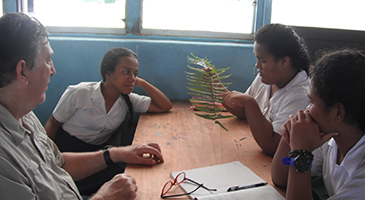Improving scientific education in the least visited country in the world
 Dr. Terence Cavanaugh, a professor and expert in educational technology from the University of North Florida College of Education and Human Services, recently concluded a two-month project for the island nation of Tuvalu - the least visited country in the world. This project, requested by the Tuvalu Ministry of Education and provided through the Fulbright Specialist Program, focused on improving failing student scores on science exams throughout the small nation by evaluating assessment data, curriculum and teaching methods.
Dr. Terence Cavanaugh, a professor and expert in educational technology from the University of North Florida College of Education and Human Services, recently concluded a two-month project for the island nation of Tuvalu - the least visited country in the world. This project, requested by the Tuvalu Ministry of Education and provided through the Fulbright Specialist Program, focused on improving failing student scores on science exams throughout the small nation by evaluating assessment data, curriculum and teaching methods.
Cavanaugh worked with Tuvaluan teachers to identify strategies to improve their instruction so more students succeed with science testing. Using assessment data and test analysis, he was able to identify student ability gaps, issues with question formation, translation and more. He also worked to update the science curriculum using local environmental issues, resources and applications as well as make learning more interactive using labs and demonstrations.
The project Cavanaugh contributed to will assist Tuvaluan students for generations, helping them to complete their secondary education and move on to higher education degrees.
The Fulbright Specialist Program provides opportunities for highly qualified United States academics and established professionals to engage in two- to six-week, project-based exchanges at host institutions across the globe in support of the host institution’s strategic priorities and goals. The specialists, who represent a wide range of professional and academic disciplines, are competitively selected to join the Fulbright Specialist Roster based on their knowledge, skill sets and ability to make a significant contribution to global projects.
